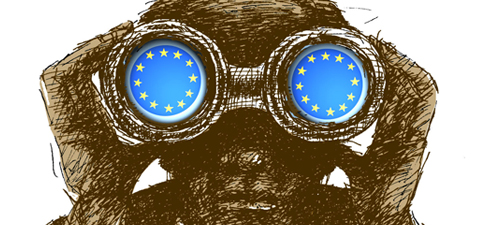Respect for privacy is no longer "a social norm," at least not according to the founder of the Facebook social network, who sells your personal data to companies engaged in marketing research. Google, which closely monitors your internet habits and presents you specially targeted advertisements, is no better. And public authorities – the people who are supposed to safeguard your privacy – are jumping on the bandwagon. There are reports that the CIA now gathers data about NGOs, politicians, journalists, universities, policy critics and opinion makers from Facebook, Twitter, Flicker, Amazon and numerous other sites.
Whereas Europe has criticised Google for monitoring users' behaviour on the Internet, the EU has in fact gone much further: in 2006, it issued the now notorious directive on the retention of data, which obliges telecommunications and Internet access providers to store all of your calls and Internet searches for a minimum of two years, and to make them available to public authorities if requested. Some member states have already adopted the directive, but they were called to order by their constitutional courts.
Security cameras are everywhere
"Since the 9/11 attacks, virtually every Western country has passed laws that undermine the right to privacy," remarks Belgian author Raf Jespers, whose book Big brother in Europa has been released this year. Belgium, which authorised extended powers for the police and judiciary in 2003, is no exception. "The worry is that security and technology have become synonymous". For Christian-democrat MEP Ivo Belet extended powers are a good idea: "Take for example the serial killer Michel Fourniret. The French police had him listed as a killer, but the public authorities here knew nothing about that. This is the kind of situation that should be prevented from happening."
The last 15 years have been marked by spectacular progress in the field of surveillance technology. It is now possible to film a crowd from a helicopter or unmanned drone. "Security cameras are everywhere," says Jespers. "In Malines the mayor is very proud of his expensive network of cameras. However, in Great Britain, many towns that installed cameras a decade ago have not seen much return on their investment." But according to criminologist Paul De Hert of VUB university in Brussels, cameras can still make a difference "in specific locations such as underground car parks for example, or on public transport in problem neighbourhoods." For Raf Jespers video surveillance is one small aspect of a much larger issue. "Nowadays, everyone can be traced by their mobile phone, their GPS receiver, electronic chips in their bus and train passes... And we haven't even begun to talk about developments in biometrics."
National politicians are hiding behind Europe
So everyone is constantly being watched no matter where they go, but you could argue that privacy continues to exist in a new form. In other words, if everyone is under constant surveillance, then no one is really under surveillance. "That is partly true," admits Jespers, " it is impossible to fully analyse so much data. But bear in mind that software applications configured to highlight certain criteria can crunch huge amounts of digital information in a matter of seconds. Don't forget what happened in the SWIFT scandal."
Young people who have grown up with the Internet are not losing any sleep over the progressive erosion of privacy, and politicians appear to be indifferent to the issue, which means that public opposition has been left to a small number of human rights organisations. "National politicians are hiding behind Europe on this question," remarks Jespers. "And if key decisions are decided by the EU, the situation will go from bad to worse."
Commission advisory boards linked to arms industry
For proof that surveillance technology has largely been accepted by the European Commission, look no further than the SIS, VIS and EURODAC databases and the advisory committees created by the Commission: "Wait till you see who sits on these committees," exclaims Jespers. "The first chairman of ESRAB was Markus Hellenthal, from the arms manufacturer EADS. In ESRIF, which took over from ESRAB, more than two thirds of the panel have links with technology and arms industries. The lobbyists do not need to do any lobbying, they are already making the decisions. The consequences are plain to be seen: in just a few years, the European budget for security research has increased tenfold to reach more than 200 million euros per year, and virtually all of the research projects are focused on the technology of control. European security has now been completely militarised."
The question is: how will the erosion of privacy affect the lives of average citizens? Can we say that those who have nothing to hide have nothing to fear? "Everyone has something to hide," says Jespers. "Maybe in ten years time, it will be an offence to own books that are now legally on sale on Amazon. Why should we trust public authorities, especially European authorities, when they do not appear to trust the public? And if that's not enough, respect for privacy still figures in the European Convention for Human Rights."
Was this article useful? If so we are delighted!
It is freely available because we believe that the right to free and independent information is essential for democracy. But this right is not guaranteed forever, and independence comes at a cost. We need your support in order to continue publishing independent, multilingual news for all Europeans.
Discover our subscription offers and their exclusive benefits and become a member of our community now!












